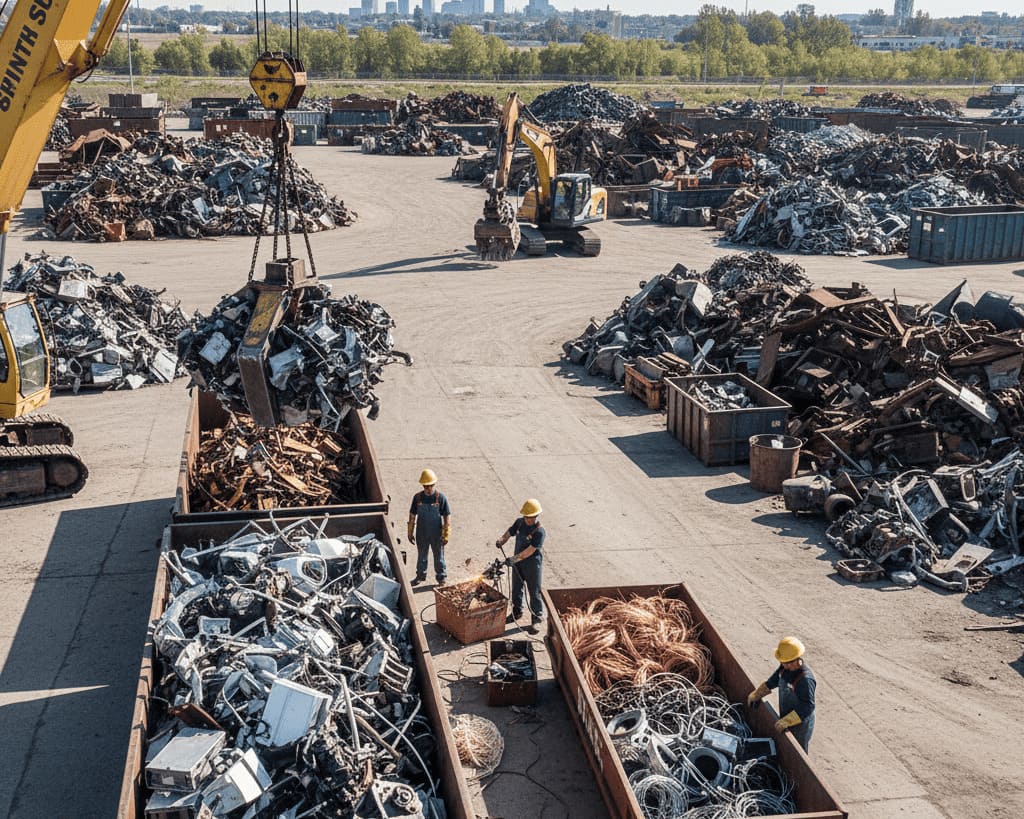What are commercial recycling services, and why do they matter
- The non-residential sector generates and diverts a large share of Canada’s commercial waste stream; national data shows millions of tonnes are diverted annually from commercial and institutional sources, and the non-residential sector accounted for almost half of diverted waste in recent national surveys. Proper commercial recycling reduces landfill use and supports circular markets.
- For Winnipeg businesses, correctly managed recycling reduces operational risk (fines, contamination incidents) and demonstrates environmental responsibility to customers and tenants. Municipal facilities such as the Brady Road Resource Management Facility and the City’s 4R depots provide important local endpoints for many commercial streams.
Common commercial recycling services offered in Winnipeg
Container supply and placement
- Front-load bins: common outside retail stores, restaurants, and apartment buildings for paper, cardboard, and containers.
- Wheelie bins (120–360 L); ideal for interior collection points and small retail or office spaces where staff move smaller amounts to a central bin.
- Large commercial recycling containers / roll-off boxes: used for construction sites, large retail outlets, or manufacturing when volumes are high. These are essential for bulky materials like cardboard, pallet wrap, and construction materials.
Scheduled collection and on-demand services
Sorting, contamination control, and education
What materials do commercial recycling services handle?
- Cardboard and mixed paper: the largest commercial stream for retailers and warehouses.
- Beverage containers and plastics: collected through blue cart systems or separate container programs; programs like Recycle Everywhere support workplace beverage-container recycling in Manitoba. Recycle Everywhere
- Metals and scrap: ferrous and non-ferrous metals are valuable and commonly collected at commercial sites. Recent national data shows a strong rise in ferrous metals diversion, reflecting industrial recycling efforts. Statistics Canada
- Organics and food waste: food service businesses increasingly separate organics for composting; Winnipeg’s organics infrastructure accepts many commercial organics when properly separated. winnipeg.ca
- Specialty streams: electronics, pallets, construction materials, paint, and hazardous wastes require specific handling and routing to licensed processors or municipal depots such as Brady Road. winnipeg.ca
Choosing the right commercial recycling containers
Small businesses and offices: practical options
Restaurants and food service: organics and grease management
Construction and industrial sites: large commercial recycling containers
Compliance, permits, and small-commercial depot access in Winnipeg
- Some City facilities welcome approved small commercial customers for select streams; businesses often need pre-authorization or to follow specific drop-off rules. The City of Winnipeg provides guidance for small commercial use of 4R depots and the Brady Road facility.
- Hazardous or regulated wastes (e.g., certain solvents, large appliances with refrigerants, electronic waste) require handling by licensed carriers and processors. Mr Garbage coordinates those routes and ensures proper documentation.
- Contracts with a commercial recycler should specify responsibilities for contamination, incident response, and proof of disposal or diversion to support corporate reporting.
Real-world Winnipeg examples: Commercial recycling in action
Retail centre: Cardboard capture and baling
Food market: Organics and composting collaboration
Construction redevelopment site: Segregated roll-offs
Measuring success: Data and reporting for commercial recycling services
- Material types collected and diversion rates.
- Destination processors and confirmation of receipt.
- Contamination incidents and corrective actions.
Choosing a commercial recycling partner: what to look for
- Local experience and networks: Partners should understand Winnipeg processors, Brady Road operations, and 4R depot rules.
- Range of containers and flexibility: Can they supply wheelie bins, front-load, and roll-offs, and adapt during project surges?
- Contamination management and training: Do they provide signage, staff training, and auditing?
- Hazardous or specialty handling: Can they route electronics, appliances, and hazardous streams properly?
- Reporting and transparency: Will they provide documented confirmation of where material was taken?
Expert view: The business case for stronger commercial recycling
How Mr Garbage helps Winnipeg businesses with commercial recycling services
- Container fleet: front-loads, wheelie bins, and roll-offs to fit any site.
- Flexible scheduling: regular pickups and on-demand services for peak periods.
- Material routing: coordination with local processors and municipal depots.
- Contamination reduction: signage, staff training, and on-site sorting solutions.
- Documentation: post-pickup receipts and diversion reporting for sustainability records.
Common challenges and how to solve them
Contamination and mixed streams
Solution: Clear pictorial signage, staffed sorting at busy times, and regular auditing reduce contamination.
Space constraints for containers
Solution: Use compact wheelie bins, increase pickup frequency, or rent dedicated off-site consolidation when possible.
Handling specialty and hazardous items
Solution: Contract a hauler experienced in specialty routing. Mr Garbage arranges safe transport and processing.
Final checklist: launching or improving commercial recycling services
- Audit your waste streams to identify top materials.
- Choose container types and placement to minimize contamination.
- Train staff and provide clear signage.
- Schedule pickups to avoid overflow and scavenging.
- Partner with a local provider who documents destinations and diversion.
- Include specialty routing plans for electronics, metals, or hazardous materials.
Conclusion
Frequently Asked Questions (FAQs)
Q1: What are commercial recycling services, and who needs them?
A1: Commercial recycling services collect and process recyclables from businesses, institutions, and construction sites. Any business producing consistent volumes of cardboard, containers, organics, or specialty wastes benefits from a commercial recycling program.
Q2: What types of commercial recycling containers are available?
A2: Common container types include wheelie bins for interior use, front-load bins for outdoor commercial stations, and large roll-off boxes for construction or bulky loads.
Q3: Can small businesses use city 4R depots for commercial recycling?
A3: Some 4R depots accept small commercial customers for select streams, but businesses usually need pre-authorization and must follow depot rules. Check the City of Winnipeg guidance before dropping off commercial loads.
Q4: How do commercial recycling providers handle hazardous or specialty waste?
A4: Licensed haulers route hazardous or specialty items (electronics, appliances with refrigerants, solvents) to approved processors. Ensure your provider documents the destination for compliance and reporting.
Q5: How can I reduce contamination in my business recycling program?
A5: Use clear, pictorial signage, staff high-traffic stations during busy periods, schedule frequent pickups, and provide staff training. Regular audits and quick corrective actions also help.

